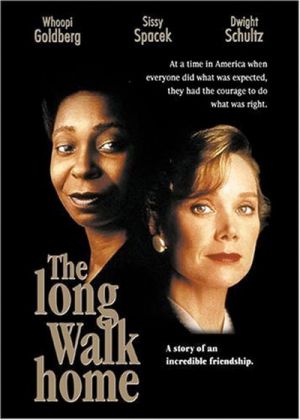The Long Walk Home (1990)
The Long Walk Home was released on December 21, 1990, in the USA. The American film was produced by Dave Bell Associates. The movie storyline was written by John Cork and directed by Richard Peace. The movie was based on the bus boycott in Montgomery, Alabama in 1955-1956[1].

Plot
Miriam Thompson (Sissy Spacek) and Norman Thompson (Dwight Schultz) are a rich married couple who live in Montgomery, Alabama. Their life composes of wealth, parties, and golf. Their kids and house is managed by Odessa Cotter (Whoopi Goldberg), an African American maid. Odessa and Herbert (Ving Rhames), her husband, live together with their three kids and protect them from the racial riot. As the racial issue becomes more serious, the bus boycott wakes Odessa's mind to inequalities and injustice. For that reason, Odessa decides to go to work by walking instead of using a bus. She wakes up earlier than she uses to though, she does not want to let her employees know about her resolution as it can cause a discharge from her job. Still, Miriam knows what she does instead of firing her, she determines to pick her up using her own car. In the end, Miriam gets caught for letting an African American riding a car and causes turmoil in the city. As the scene turns more serious, people in the city realize that African Americans actually have the same rights as everyone in the country, and people start to treat African Americans equally[3].
Black Empowerment
The are many scenes that show the empowerment of African Americans. Like when the African Americans settle to boycott the Montgomery bus as it was segregated for the African Americans have to seat at the back of the bus. Another moment where Miriam gets caught by her husband for riding a car with an African American, she defends it as it is her duty to pick Odessa up instead of letting her walk to go to work for hours. Another scene shows when Miriam starts to empathize with African Americans that they have to walk and eventually defends African Americans for having equal rights with everyone by defending Odessa at the crowd in the middle of the city[4]. Bus boycott has shown as a symbol of the black Americans that they have enough bigotry. The black workers, ministers, communities collaborated together to establish a well-organized mass movement. They would rather walk with their foot with dignity rather than riding a bus in shame. The decision and the unity of black Americans have made liberated their freedom to be respected and living with dignity as black Americans[5].
Controversy
The film is shown how racist it was at the time in Alabama. For instance, where violence occurs when Miriam gets caught picking Odessa up. People mock and slap her for picking up an African American. They also crush the car as it is full of dirt and an insult. Another scene shows where Odessa's kids get beaten by some racist white kids. Also, Miriam's brother in law mocks the boycott and even gives racial slurs on African Americans[6]. Black Americans are deemed to be inferior compared to white folks. The black Americans mostly are employed to be maids, taking care of children while white folks have many job opportunities. Even at some point of view, Miriam tends to offer to pick Odessa up because it can assist Miriam's life, not to make Odessa's life easier[7]. The bus boycott also impacts badly to several people of black Americans. As Miriam tells Norman about joining the volunteer of car poor for black workers, Norman is scared as his business could be wrecked by many of his white associates. Ultimately, the bus boycott smashes the economy of the people around Montgomery[8].
References
- ↑ The Long Walk (1990). IMDb. Retrieved January 14 2021
- ↑ The Long Walk (1990). RogerEbert. Retrieved January 14 2021
- ↑ The Long Walk Home. TVGuide. Retrieved January 14 2021
- ↑ The Long Walk Home. RogerEbert. Retrieved January 14 2021
- ↑ Ed McNulty. The Long Walk Home (1990). Visual Parables. Retrieved January 30 2021
- ↑ The Long Walk Home. Spirituality Practice. Retrieved January 14 2021
- ↑ Hal Hinson. 'The Long Walk Home' (PG). The Washington Post. Retrieved January 30 2021
- ↑ Owen Gleiberman. The Long Walk Home. EW. Retrieved January 30 2021